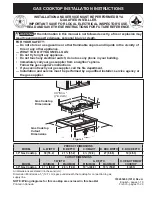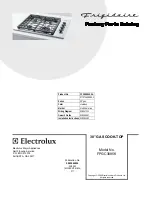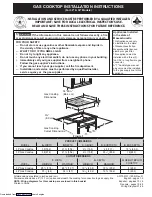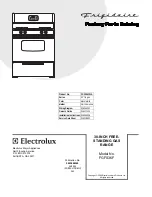
INSTALL THE PRESSURE
REGULATOR AND CONNECT
• For all connections, use a pipe sealant
approved by local codes and resistant
to the activity of L.P. gas.
• Install the pressure regulator in the gas line as
close to the cooktop inlet as possible to allow
clearance for ventilation ducting.
• Make sure the arrow on the body of
the regulator is pointing straight up and toward
the cooktop. Any other position will affect
the output pressure of the regulator. This
arrow indicates correct gas flow direction.
• Install a manual gas line shut-off valve in
an easily accessible location.
Installation Instructions
INSTALL THE COOKTOP
PREPARE THE COOKTOP
(cont.)
Remove the blank 9-pin connector plug from
the 9-pin receptacle on the bottom of the cooktop
and discard. Connect the 9-pin plug on the blower
assembly to the matching 9-pin receptacle on
the bottom of the cooktop. Secure the connector
cover to the cooktop using 3 screws, making sure
the power cord comes out the U-shaped opening
with the wires to the motor.
10
9-pin
connectors
Connector
cover
27
11
Regulator
Solid piping or
flexible connector
Union
Pipe stub
Shut-off
valve
Solid piping
or flexible connector
INSTALL THE PRESSURE
REGULATOR AND CONNECT
(cont.)
NOTE: Instead of using solid piping to connect
to the pressure regulator, an approved flexible
metal appliance connector may be used between
the shut-off valve and the pressure regulator,
if local codes permit.
Appropriate flare nuts and adapters are required
at each end of the flexible connector.
Make sure all the knobs are in the off position.
Hook up the gas line and check for leaks.
TEST FOR LEAKS
WARNING:
DO NOT USE A FLAME TO CHECK
FOR GAS LEAKS! Do not use the cooktop until all
connections have been leak tested.
Perform leak test per the following instructions:
1. Purchase a liquid leak detector or prepare a soap
solution of one part water, one part liquid detergent.
2. When all connections have been made, make
sure all cooktop controls are turned to OFF and
turn the gas supply valve to ON.
3. Apply the liquid leak detector or the soap solution
around all connections from the shut-off valve to
the cooktop.
4. A leak is identified by a flow of bubbles from
the area of the leak.
5. If a leak is detected, turn the gas supply off.
Tighten the fitting. Turn the gas on and test again.
1.
If the leak persists, turn the gas supply off and
contact your dealer for assistance. Do not attempt
to operate the cooktop if a leak is present.
IMPORTANT: Disconnect the cooktop and
the individual shut-off valve from the gas supply
piping system during any pressure testing of that
system at test pressures greater than 1/2 psig.
Isolate the cooktop from the gas supply piping
system by closing the individual manual shut-off
valve to the cooktop during any pressure testing
of the gas supply piping system at test pressures
equal to or less than 1/2 psig.
11
















































